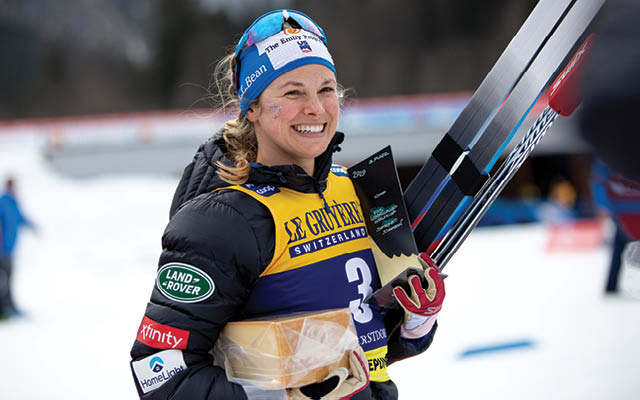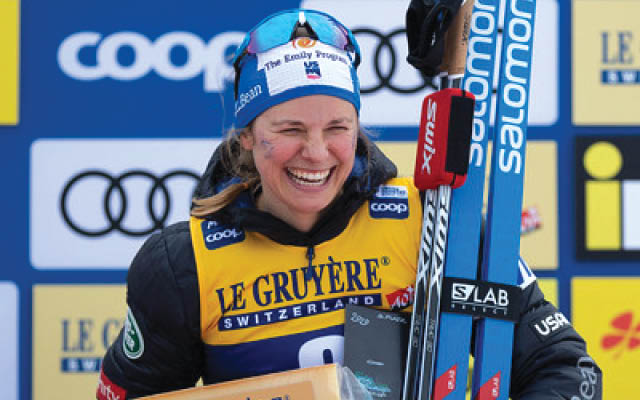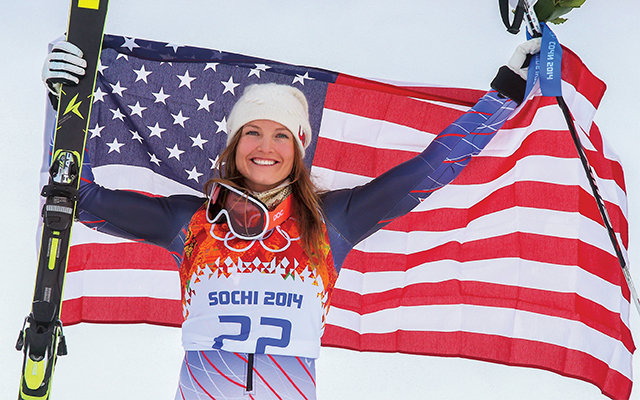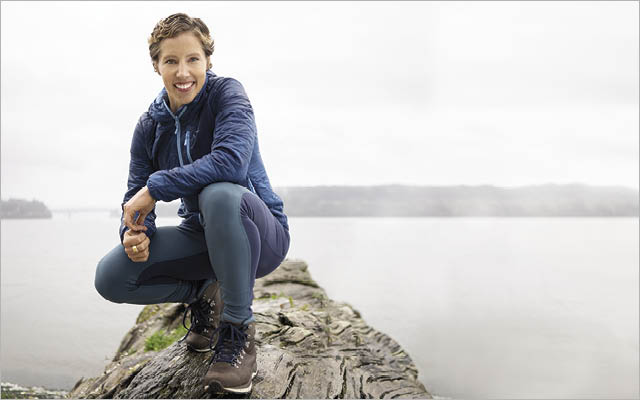Jessie Diggins has rolled her ankle. It’s only a sprain, but even a mild injury can be a blow, and she doesn’t need any more setbacks in a year of setbacks: The 2019–2020 World Cup Nordic-skiing season was curtailed; 2020–2021 races are cautiously going ahead with COVID-19 protocols and without spectators to protect everyone from the pandemic; and the 2022 Beijing Winter Olympics are currently in question.
Yet Diggins doesn’t appear fazed. Today’s her day off from her usual four hours of intensive training, but she’s in the swimming pool, walking in the water to build ankle mobility. And talking to EL as she goes.
“For me, ski racing is more than just winning, it’s more than just medals — it’s the pursuit of a bigger goal. It’s trying to make yourself a little bit better than you were the day before. You can do that whether you’re doing workouts in your backyard or in your living room or you’re racing on the World Cup,” she explains. “So for me, I keep the hope alive by knowing that it’s more than just racing.”
Diggins has become almost as famous for that golden attitude as for her 2018 Olympic gold medal.
In 2013 she and Kikkan Randall became the first American women to win a World Championship in Nordic team skiing. Then, at the 2018 Winter Olympics in Pyeongchang, South Korea, the duo scored a breathtaking victory in the team sprint against the mighty Scandinavian squads. Their triumph was a milestone — the first Olympic gold for American women cross-country skiers.
Now, with six World Cup victories and 23 podium finishes, as well as four World Championship medals, Diggins has become an ambassador for the flourishing sport. Her energy and can-do determination inspires a new generation of young Nordic skiers. In pep talks and training camps around the country, she empowers junior ski teams with positivity and possibility.
Born into a Minnesota family that was enamored with winter sports, Diggins took to Nordic skiing naturally and rose through club ranks to become a high school star. But skiing wasn’t everything to her: “I find joy in pushing myself to new limits,” she says. “I love adrenaline-filled adventures like cliff jumping, bungee jumping, and skydiving.”
There were plenty of hurdles along the way. She recalls weight training for skiing at her high school gym, where a male football player tried to muscle her aside while she did band-assisted pull-ups, announcing he was going to do “real pull-ups.”
“I was furious that, because I was a girl, he assumed he could boss me around and take over the lifting equipment just because he was going to lift something heavier,” she recalls. “But maybe I should thank him, because I was intensely motivated to progress to unassisted pull-ups pretty quickly after that.”
And now, she says, “My Barbie doll is jealous of my biceps.”
There have been other challenges as well. Committed to a grueling race regimen, she developed an eating disorder masked as a training and dietary plan. In 2010 she turned to the Emily Program, a national treatment center for eating disorders.
“Fighting for myself in recovery remains the hardest thing I’ve ever done — but also the most important thing I’ve ever done,” she says. (For more on Jessie’s recovery, see “Jessie Diggins: An Athlete’s Eating Disorder — and Recovery.”)
Today, she proudly wears the Emily Program’s logo front and center on her race gear.
And although she’s focused on the World Cup and the Olympics, she’s also looking out further, for a larger, tougher win.
“I want to make sure the next generation of girls knows that they can get after it in any sport they choose,” she says.
As a symbol of this, she makes up her race-face with glitter to blend with her grit.
“I hear from many young women in sport that they’re not allowed to be fierce and feminine at the same time,” she explains. But in her brand of skiing, she says, “racing all-out from the gun and pushing your body past limits has become synonymous with ‘racing like a girl.’”
Experience Life | How do you focus your training and keep hope alive for the coming World Cup season and the Olympics in the midst of so much uncertainty?
Jessie Diggins | I’ve been training with the intent to race, so even if we don’t get to race, I’ll at least carry that fitness with me next year. You still work toward a goal and improve your fitness and improve your mental toughness — and that’s not something that you lose. You get to carry that forward.
I like that feeling of going out and working on my technique, working on ski bounding, working on my ankle mobility! I’m working on all these different things to get better, and there’s such a sense of satisfaction in knowing that you’re working toward something.
When you’re working toward a goal, you feel more motivated, you feel more satisfied, you feel like you have a sense of purpose. It can be hard to continue to have that sense of purpose in these uncertain times when you can’t really plan on any one concrete event happening. But for me it’s that sense of trying to be a little bit better than I was last week or last month or last year.
EL | How do you maintain your optimism in dealing with all the other turmoil in the world at the moment?
JD | I keep my hope alive by trying to be the best person and ally that I can be. I’ve been spurring myself to read a lot of different books about racial justice to challenge how I’ve thought about things, to challenge the conversations I have with people around me because, as with training, I feel like it’s an opportunity to be better than the version of myself that I was in the past. I want to be more aware and be better at anti-racism than I have been to this point.
That’s not to say that I feel like I haven’t been an ally, but we can always do better, we can always do more, and we can always work to improve our humanity and just be better people. Instead of seeing it as something really uncomfortable or scary, I see it as a chance to improve and an opportunity to be better and to help more than I have in the past.
EL | You now have a platform to elevate causes you believe in, such as the Emily Program and Protect Our Winters.
JD | The Emily Program is an amazing treatment center — they do such good work. They’re trying to literally save lives and improve the quality of life for so many people. It’s an honor for me to be an advocate and ambassador for them and say, “Look, eating disorders don’t discriminate. They can affect so many people — men, women, any race, any gender. This is a problem that we all face, and so we need to make it less of a taboo topic and break down those barriers of care.”
I’ve been really involved with Protect Our Winters this year — it’s a silver lining of the COVID situation, because normally I wouldn’t be able to leave my training and go be part of the lobby week on Capitol Hill. But this year it was all virtual, so I’m in! I can do this! I can go train four hours a day and in between I can sit in on Zoom meetings and meet with senators and representatives and share why I’m so passionate about our environment.
And so I really appreciate the opportunities that the platform I have now has given me: I feel like I can take this moment in time, when ski racing has given me a little bit of a spotlight, to try to do something that really matters, so that when I look back on my career I didn’t just make it about ski racing. I want to feel like I contributed to helping solve some problems at least in the way that I can, even though that’s really small. I want to feel like I did something.
EL | And you’re getting married, which shows great hope for the future.
JD | Absolutely! We’re definitely taking our time, not only due to COVID but also the run-up to the 2022 Olympics. We’ve decided to get married in the spring after the Olympics, which gives us time to enjoy this engagement. It might be delayed a year or pushed back a little bit, but it doesn’t mean it can’t happen eventually.




This Post Has 0 Comments